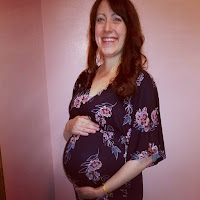To Be or Not to Diabetes: A Look at Gestational Diabetes
When I read that I would need to be screened for something
called gestational diabetes at the beginning of my pregnancy, I didn’t give it
much thought. It did not seem like something that deserved a wealth of my attention.
My thinking pattern was, “Well, I don’t have diabetes now, so this must just be
some sort of routine test that I’ll pass with flying colors.” So, imagine my
surprise, when I found out that I was considered at-risk when I was 3 mg of
sugar over the standard of 140mg of sugar per 100 milli-liters of blood on my
one-hour screening exam. This is how it goes generally: Around 28 weeks of your
pregnancy you will be instructed to drink about 60g of sugar in the form of a
glucose beverage, grape juice, or a bunch of Twizzlers an hour before your
blood test. Then you’ll get a sample of blood drawn at your lab, midwife, or
obgyn visit. You’ll get the results back within a day or so and if the number
is over 140mg (depending on where you live and who you see) then you may be
instructed as a standard of care to take the 3 hour glucose test. When I asked,
I found out that my mom also had the very same situation occur when she was
pregnant with me. She had “failed” her screening test, but then passed her 3
hour test without problem. And the same occurred to a lot of my other friends
and family who had been required to take the 3 hour test. This made me a bit
indignant. And of course I wanted to sleuth and understand the real nature of
this gestational diabetes so I asked my midwife, who reassured me that I’d pass
the test, and my doula who sent me a very informative article that I want to
pass along to you now: http://www.drbrewerpregnancydiet.com/id33.html.
Turns out I did pass my 3 hour test; in fact, I almost
passed it TOO efficiently. I had a resting glucose level of 72 (range of 70-94
mg/dL), a one hour of 103 (70-179 mg/dL), a two hour of 79 (70-154 mg/dL) and a
three hour of 48 (70-139 mg/dL). When I reported these findings to my main
midwife she said that it is what she expected and not to worry about the low
number after 3 hours. What I had done to make sure that I kept my glucose
levels at what I perceived to be “normal functioning” was I followed some of
the suggestions laid out in the abovementioned article. I walked one mile or 20
minutes between each blood draw in a nearby subdivision to the lab, I drank
lots of water, and I tried to keep my stress down by doing a 10 minute guided
body scan before each blood draw following the calming voice of Tamara Levitz
in the Calm phone app. If it seems like a lot of work, perhaps it was, and
after 10 hours of fasting and another 3 hours of only consuming some generic
sugar beverage, I don’t necessarily think that it was the best for my growing
Rose to have to subject her and my body to such a strange rigmarole. I’m
grateful that I passed and that I did not undergo any dizziness or nausea while
fasting for so long.
The subject of gestational diabetes is contested and the
standards have changed. What that means is that over time, pregnant women who
were not at once considered to be affected, if tested today, would suddenly
have a problem. And I say problem because this could be the difference between
a low-tech birthing experience and a highly-monitored one, meaning that if your
test says you are diabetic gestationally, you may have to take hourly blood
pricks and insulin treatments. And then your baby may also undergo more
ultrasounds as well as monitoring during a hospital-based birth and heal pricks
following the labor. Surely, this could be necessary if the mother has “poorly-controlled
clinical diabetes” (Jones article), but “no study in any of the medical literature indicates
adverse effects from ‘gestational diabetes.’”
I think my friend said it best when he messaged me to calm my
worry, saying, “Honestly, it seems to me that gestational diabetes is a dynamic
concept and an inexact science.” In fact, this phenomena could be attributed to
the fact that research has been done mainly on under-nourished women, for a
healthy pregnant woman may store her glucose for later use, thus indicating a
higher glucose level on the screening test, she may have more in her blood
because the blood is filtrating itself differently during pregnancy, and the
hormones involved in growing a babe might also play a role. That’s why I think
it is important to take into consideration if a pregnant woman was diabetic
before her pregnancy and if she maintains a relatively balanced diet and
exercise regime. Otherwise, we could be diagnosing a whole population of pregnant
women and subjecting them and their babies to unnecessary, stressful, and
costly interventions.
Now, I’m not trying to advise you better than your midwife. I
simply want us all as a community to be equitably informed and understand our
options at any given moment. I think more than anything, I’m advising you to
understand your body and what is happening to it from a multi-faceted,
evidence-based plethora of sources. Ask more than one doctor. Read articles.
Talk to your doula. Do a little qualitative research with your friends. And
then figure out what is best for you and your baby. (Free Birth Society has a very informative blog and one of their posts was on this subject as well as ultrasound technology, group B strep, and Rh negative blood testing. Have a listen: http://freebirthsociety.libsyn.com/gestational-diabetes-gbs-ultrasound-technology-and-rh-negative-a-new-perspective)
If any of you have been diagnosed with gestational diabetes
(without being diabetic before pregnancy) and have found the interventions
after pregnancy to be necessary and helpful, please feel free to post and share
your experience. Also, if you have been mis-diagnosed through screening and
passed your 3 hour test or were considered to have gestational diabetes but
without any other symptoms or effects, please share your story, as well.
Namaste,
Katie



Comments
Post a Comment